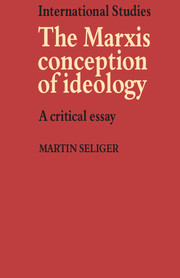A prefatory note and acknowledgments
Published online by Cambridge University Press: 05 June 2012
Summary
For almost two decades now we have witnessed a remarkable resurgence in the West of a concern with Marx and Marxism both scholarly and ideological. Although in the proliferating studies of aspects of Marx's work, it is Marxist and pro-Marxist authors who have taken the lead, they have actually engaged in some criticism, even if on the whole they present, or elaborate on, a Marxian Marxism often more or less removed from Engels. They tend to play down those elements which are regarded as intellectually obsolete and those, above all, which furnish too obvious a foundation for the least engaging traits of communist rule and Marxist revolutionism.
In connection with this trend in Marx scholarship, fundamental tenets of Marxist ideology have regained in the West an ascendancy which in the 1950s nobody could have foreseen, as distinct from having desired. As in the 1920s and 1930s, the political echo nowadays raised by (neo-)Marxist ideology is out of proportion to the number of those actually committed to it. On the one hand, social democrats and progressive moderates in general have been caught napping ideologically on the laurels of post-war recovery and its corollary, the relative ideological quiet of the 1950s, characteristically misconceived as ‘the end of the age of ideologies’.
- Type
- Chapter
- Information
- The Marxist Conception of IdeologyA Critical Essay, pp. ix - xivPublisher: Cambridge University PressPrint publication year: 1977

